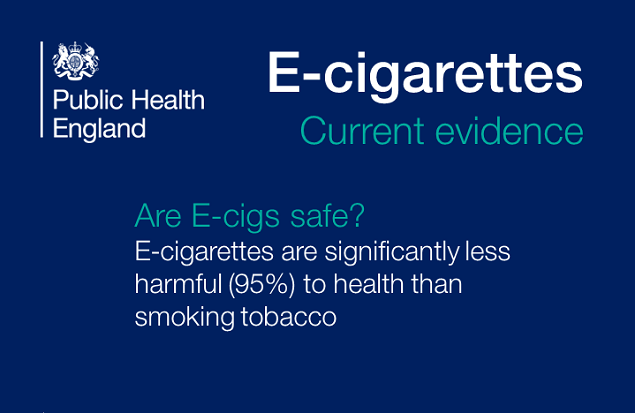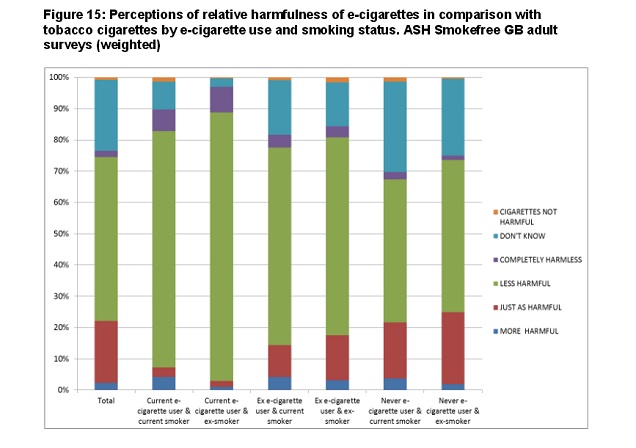
With all-too-common claims that e-cigarettes expose users to harmful chemicals, pose unique risks of poisoning or explosions, are a gateway to smoking and that we “just don’t know yet” whether they’re safer than cigarettes, it’s very refreshing to see a public health body backing the available science and putting out a rational, evidence-based estimate of the likely risks of vaping. Public Health England has reviewed the additional evidence released since the publication of their last report, and their conclusion backs the oft-repeated comparison that e-cigarettes are 95 percent less harmful than smoking.
The report might not add anything new – being a review of already-available evidence – but it highlights the vast discrepancies between the public perception of the risk of vaping and what the science actually says, not to mention the borderline criminal levels of irrationality about vaping from US-based organizations.
The FDA says that “consumers currently don’t know […] whether there are any benefits associated with using these products” while Public Health England say that encouraging smokers to switch “could help reduce smoking related disease, death and health inequalities.”
Why the difference? The simple answer is that one group is trying to accurately communicate the facts while the other is more concerned about sowing mistrust even if it isn’t justified. No prizes for guessing which is which.
The Report: E-Cigarettes – An Evidence Update

The report is available in full, but running to over 100 pages, it’s probably not something most smokers or vapers will really find themselves combing through in full. However, it’s very comprehensive, and it addresses many of the over-hyped risks of vaping frequently repeated by the media.
Among other findings, the report states that:
- There is no evidence that e-cigarettes are having negative effects on the decline of smoking rates, and they’re actually likely to be helping in the fight against smoking. E-cigarettes are not “renormalizing” smoking.
- The gateway hypothesis is ill-defined, and there is no evidence to suggest that e-cigarettes are serving as a gateway to smoking. It even suggests that the use of such terminology should be abandoned altogether until such a time when the hypothesis is developed to a point it can actually be tested (don’t hold your breath waiting for that to happen).
- Regular vaping among never-smokers (adult or youth) is rare (consistently at 0.2 percent or lower). Experimentation is fairly common, but it rarely progresses to regular vaping.
- There is evidence that e-cigarettes help smokers quit, and that they help them reduce the amount they smoke. Additionally, the report acknowledges their apparent effectiveness among those who didn’t intend to quit smoking. They also call for more research in this area in general.
- E-cigarettes pose no risk of nicotine poisoning when used as intended, but e-liquid should be sold in child-proof packaging. There is no cause for concern about the accuracy of nicotine labeling, despite frequent claims to the contrary.
- The limits on the nicotine content of e-liquids set to be imposed by the EU regulations will likely negatively affect heavier smokers looking to make the switch.
- Regulators should consider the extent to which currently-proposed rules will restrict the availability of safe and effective products – the goal should be maximizing benefits of e-cigarettes while keeping risks to a minimum. They add that “The appeal of [e-cigarettes] may rest in the fact that they are not medicines.”
- There is no reason to treat e-cigarettes the same way as cigarettes. They say it isn’t appropriate to include e-cigarette in smoke-free policies in health trusts and prisons “unless there is a strong rationale to do so.”
- There are no identified health risks from e-cigarette use to bystanders, and levels of nicotine released are negligible.
- The New England Journal of Medicine formaldehyde study and the mouse study suggesting a reduction in anti-bacterial defenses were both poorly conducted and neither represents a realistic concern for vapers.
There are some other great summaries of the findings available from the Electronic Cigarette Industry trade Association and from Clive Bates, if you’re interested in further discussion of the general findings of the report.
E-Cigarettes Are 95 Percent Less Harmful Than Cigarettes, but Almost Half of the Public Think Otherwise

One of the key points Public Health England are pushing with the release of the new report is the evidence-based conclusion that e-cigarettes are about 95 percent less harmful than cigarettes – and possibly even safer than that. The reason for this is that the public – most of whom only learn about e-cigarettes through news reporting of often-flawed research – don’t seem to accept this conclusion.
The report cites surveys of the public on their perception of risk from e-cigarettes in comparison to combusted cigarettes, which generally show that while a slim majority correctly responds that e-cigarettes are less harmful than cigarettes, about 45 percent either don’t know, believe they’re equally as harmful or think they’re even more harmful than cigarettes. The report stresses that the number correctly responding that e-cigarettes are less harmful than cigarettes is declining in recent years, both in the UK and in the US, although current smokers or vapers still predominantly hold the correct view.
Later in the report – when the inaccurate media reporting of recent research findings is discussed – they add “The ongoing negative media campaigns are a plausible explanation for the change in the perception of [e-cigarette] safety,” and point out that this may be responsible for a recent decline in the number of smokers switching to vaping.
To vapers, this has been the reality we’ve lived for some time, but this report – and the accompanying press statements – emphasize the realistic estimate for the risks of vaping (likely less than a 20th of the risk of smoking) and the need to publicize this estimate to correct the inaccurate view held by many members of the public. The report has gained some media attention, but with many still pushing the hypothetical risks, getting the message out will likely be an uphill battle.
Inadvertently Highlighting the Irrational Anti-Vaping Attitudes of US Organizations
This line from the report is all you need to know about the safety of e-cigarettes: “While vaping may not be 100% safe, most of the chemicals causing smoking-related disease are absent and the chemicals that are present pose limited danger.”
It’s to-the-point, simple and completely rational. The contrast between this and statements from organizations like the CDC and FDA in the US are striking. The FDA’s webpage about e-cigarettes can be summarized simply as “we don’t know yet and it might be bad.” The CDC is bizarrely treating vaping as if it is just as bad as smoking, and avoids discussing their relative risks as much as possible. Think about the implications of such advice: if you’re a smoker, looking to a trusted public health body for information about a potentially life-saving product and all you get is limp statements of uncertainty or a refusal to acknowledge their reduced risks, there’s a significant chance you’ll say “well, I might as well keep smoking.”
And of course, the FDA and CDC are hardly the worst offenders. The California Department of Public Health is rapidly-becoming the leading fountain of misinformation about vaping, with their report pushing the core message that e-cigarettes are a “community health threat,” as well as claims that e-cigarettes emit a “concoction of chemicals toxic to human cells in the form of an aerosol,” pose a huge poisoning risk and deliver “nicotine, a highly addictive neurotoxin.” Did they even look at the same evidence as Public Health England, or was the report just written by irrational anti-nicotine extremists?
When Public Health is Your Concern, E-Cigs Are Your Friend

Overall, Public Health England’s updated report presents an accurate and rational assessment of the evidence, and highlights the damage done by the continuous spread of misleading information about e-cigarettes. Whether public health groups in the US will ever decide that smokers deserve reliable information about a potentially life-saving product remains to be seen, but in the meantime, smokers can at least look to public health organizations in other countries for an accurate assessment of the likely minimal risks of e-cigarettes.

